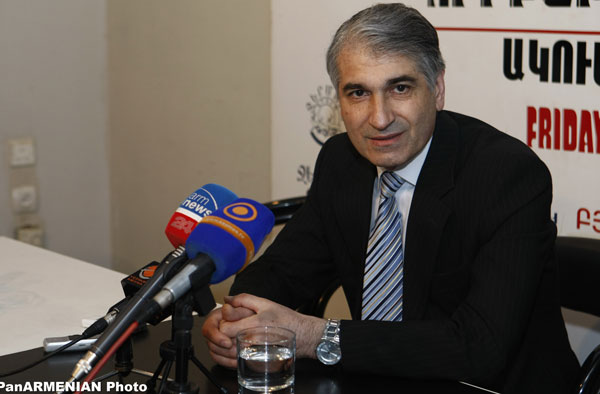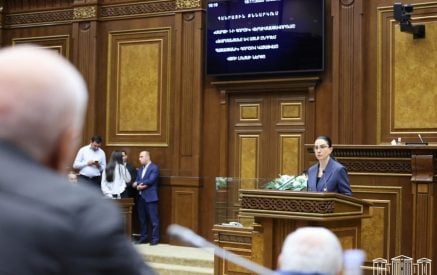As per observation made by economist Gagik Makaryan, this is expected to Armenia if the World Bank forecasts are realized.
Distance “shooting” between Armenia’s second President Robert Kocharyan and Prime Minister of Armenia, Tigran Sargsyan, which lasted a few days, distracted the attention of the public from no less interesting topic revealed to the arena on those days. Recently, the World Bank’s (WB) report on “Global Economic Prospects” was published, in which the World Bank experts have made several interesting observations with regard to Armenia. In its annual report, the World Bank had predicted that sharp decrease of paces of economic growth in Russia in 2014-2016 may hinder the progress of a number of CIS countries considerably dependent on this country, including Armenia. According to the report, Armenia, Kirgizstan, Moldova, Belarus, and Uzbekistan will have problems with money transfers, imports, and foreign investment.
Contrary to the World Bank experts’ opinion, President of “Republican Union of Employers of Armenia”, Gagik Makaryan, finds that as a result of the deteriorating economic situation in Russia, particularly, there will not be big problems in our country, since Armenia does not export industrial products, nor imports from Russia, and the trade with this country is largely in the form of food and drinks.
“Our foreign trade with Russia amounts to approximately 1.1 billion dollars, of which 277 million dollars is our export to Russia. The rest is imported from Russia. We mainly import petroleum and natural gas from this country. Gas service will not stop, because it will not be particularly associated with economic conditions worsening or non-worsening, especially when now it was given to “Gazprom”. What we receive from Russia are energy carriers, some power plant raw material and diamond raw material, we get nothing else from Russia,” says the President of the Union.
Read also
Mr. Makaryan opines that the export might suffer in a small, but given that about 136 million in 277 million dollars, in other words, half of it are alcoholic beverages, he is confident that the Armenian brandy consumption occupying Russian market will not fall, and the export quantities will be maintained.
According to him, “13 million dollars in fresh fish, 13 million in apricots, peaches, and other fruits. These are not so critical quantities that no matter Russia’s economy worsens they would not buy these products from Armenia, especially in the presence of friendly sentiments as a Customs Union member country. Russia is a little politicized state, and the word of its head will be certainly taken into account. I think we would not have very significant problems to this respect. We receive approximately 24 million dollars raw diamond. If we continue to process it, we will still get the raw material, in other word, the rest of the numbers that we are in trade relations with Russia, are not industrial products, therefore, worsening of Russia’s economic situation will not have much negative effect for Armenia. We do not import industrial products from Russia, we do not sell industrial products to them, for example, should we were selling industrial products in great quantities, Russia economic worsening could affect.”
Referring to the view of some economists that Russia’s poor economic situation will directly affect decrease of private remittances to our country, Mr. Makaryan said, “It may happen because a majority of residents of Armenia is involved in construction sector, and the crisis, firstly, is always hitting the real estate market, the real estate demand is falling, which results in reduction of construction volume. However, even during the previous crisis, I remember that remittances went down for just a few months, then again, it seems, came to the former position. In that sense, I agree that people’s money in hand can be reduced due to the decrease of remittances, and especially in the construction block.”
Private remittances coming to Armenia, which make up about one and a half million dollars, as calculated by Mr. Makaryan, will be reduced by about 300 million dollars, for just a few months, until Armenians working in Russia will find another job. “It will be essential to our economy, poverty in our country will go up, purchasing power will go down, and since these poor families or some families who have low-income than the average and are living at the expense of this money, they will reduce their ability of spending. We can not overcome the poverty at our own schedule, if we have made plans today on some terms on how much the poverty should be reduced. The second problem will be that the decrease in the quantity of money will affect on the micro businesses. This would mean that the situation in micro businesses would be somewhat deteriorated. This will lead to the closure of a number of micro businesses, or the survival challenges thereof, etc., but it depends on to what extent it will be held in Russia, because Russia being a political state, from time to time, conducts such gigantic projects that can quickly compensate for these predictions. Russia itself, in general, has a complex economy, and it is not a competitive state. And, then, these political assessments that are given by international organizations, are possibly done to reduce Russia’s attractiveness in the eyes of the world and the investors.
Russia is a political state and has an authoritarian regime, and the European countries and the United States are not so pleased with these situations, therefore, there arises the problem that they are trying to build barriers around it.”
Lusine BUDAGHYAN


























































